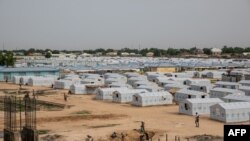The United Nations is appealing for $1 billion to help 6.4 million of Nigeria’s most vulnerable people, including two million who have been forced to flee their homes because of armed conflict.
The bulk of the money will be used to provide life-saving assistance to millions of people in Nigeria’s northeastern states of Borno, Adamawa, and Yobe. The insurgency by the militant group Boko Haram, which began in 2009, has expanded to include other armed groups.
Jens Laerke, spokesman for the U.N. Office for the Coordination of Humanitarian Affairs (OCHA), says the brutality and suffering inflicted upon millions in that area of ceaseless conflict show little sign of relief. He says people are hanging on by a thread and are in desperate need of help.
“Over five million people there are at risk of acute hunger during the upcoming lean season as the worst outlook in four years. And that is due to escalating conflict, displacements and the disruption of livelihoods, which is made worse by the effects and restrictions of COVID-19,” Laerke said.
The lean season, the period between harvests when food stocks are at their lowest, lasts from May to August. Famine has not been declared in any part of the country. However, the World Food Program reports suffering has reached emergency levels in parts of northeastern Nigeria.
WFP spokesman Tomson Phiri warns armed conflict in the region is preventing people from growing food, leading to a potential hunger catastrophe. He says there has been significant cropland reduction in over 90% of the region over the past decade because people have fled their homes and abandoned their land.
“Millions of people are already facing dangerous levels of hunger as their lives and livelihoods are being severely disrupted by non-state armed groups who are vying with each other and fighting against government forces for control of territory,” Phiri said.
OCHA says the largest amount of money from the appeal, $354 million, will be spent on food. Other priorities, it says, include nutrition, water and sanitation, hygiene and protection. Money also will be used for livelihood programs to help people get back on their feet.




